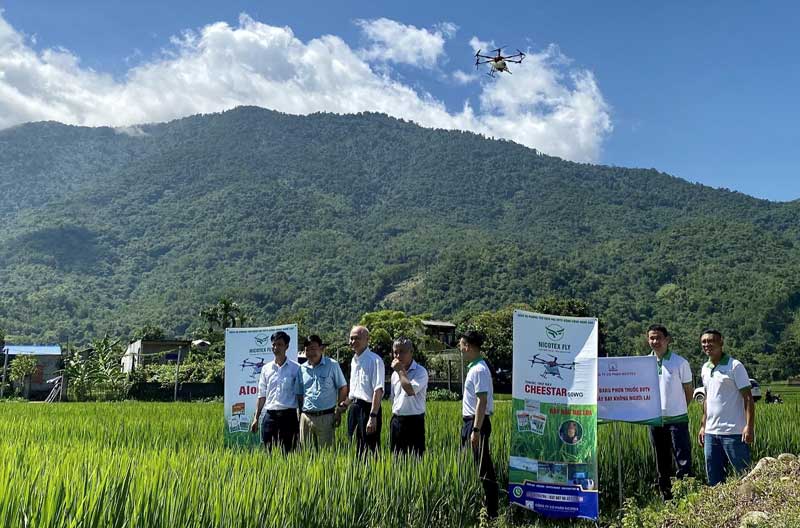
(HBO) - Hoa Binh province has set a goal of having revenue from the digital economy making up about 20 percent of its GRDP by 2025 and over 30 percent by 2030, in its efforts to grow amid the 4th Industrial Revolution.

Automatic irrigation machines and insecticide-spraying drones.
Also by 2025, the province targets to build broadband
internet infrastructure in communes, wards, and towns, basically complete
digital transition at public agencies, and get the local smart city planning
done. By 2030, it aims at ensuring 5G network coverage for locals to enjoy
high-speed internet at a low cost.
To actively join the revolution, Hoa Binh prioritises breakthroughs
in IT application, digital infrastructure development, and the building of
smart agriculture, tourism and urban areas, among others.
The local infrastructure basically meets requirements for
management and IT application, with all public agencies having internal
networks and connected to broadband internet services.
The provincial portal for administrative services,
established in July 2019, has so far received 4,629 documents. The local centre
for smart urban area management, meanwhile, was put into operation in September
this year. The Hoa Binh People’s Committee will complete the building
of its paperless meeting room system in October.
The province has also recorded increasing numbers of
businesses and services based on digital platforms, creating more opportunities
for locals to seek high-income jobs.
Regarding agriculture, technologies have been applied in
production, preservation, and distribution, with many localities, individuals,
and units operating a series of smart equipment such as automatic irrigation
machines and insecticide-spraying drones. The province has encouraged its
residents to engage in the One Commune One Product programme, register for
trademark protection of their farm produce, and expand production following the
VietGap standards.
In the medical sector, 100 percent of local hospitals have
installed applications for data management that link with the national
healthcare data system. Meanwhile, the education sector has included the
teaching of science, technology, engineering, and mathematics (STEM) in its new
curriculum for high school students. The transport sector has put into operation an AI platform
to handle traffic violations.
Hoa Binh has also worked with the Vietnam Posts and
Telecommunications Group (VNPT) to build a host of projects on smart tourism./.
Hoa Binh province is undergoing a dynamic transformation amid Vietnam’s national digital transition. Building on Poliburo’s Resolution No. 57-NQ/TW on breakthroughs in science, technology, innovation, and national digital transformation, the province has rolled out a wide range of practical action plans. A standout initiative is the "Digital Literacy for All” movement, an effort to ensure that no one is left behind in the digital era.
Hoa Binh province is undergoing a dynamic transformation in the wake of the national digital transformation movement. Building on Resolution No. 57-NQ/TW of the Politburo on breakthroughs in science, technology, innovation, and national digital transformation, the province has implemented a wide range of practical action plans. A standout initiative is the "Digital Literacy for All” movement ambitious effort to ensure that no one is left behind in the digital age.
With a spirit of unity and proactive problem-solving, the Party Committee, the government and the people of Dong Lai Commune (Tan Lac District) have made great strides in implementing the resolutions of the 24th Party Congress of the commune for the 2020 - 2025 term. Focusing on leadership and practical actions, the commune has brought the Party’s resolutions into daily life, creating strong impacts and pushing the local development forward.
Amid the nationwide push for digital transformation, young people in Hoa Binh Province are stepping up as dynamic pioneers, applying technology to enhance Youth Union operations and expand the reach of youth-led initiatives. Through creativity and adaptability, Youth Union organizations at all levels have introduced a series of practical solutions, contributing to modern governance and community development.
In recent years, An Nghia commune, located in Lac Son district, has stepped up administrative reform, focusing on improving the quality and efficiency of its single-window service unit for receiving and processing administrative procedures. These improvements have helped create favourable conditions for local residents and organisations to handle administrative procedures, contributing to the commune’s broader socio-economic development.
The Prime Minister-approved master plan to develop the multi-use value of forests ecosystems through 2030, with a vision to 2050, aims to improve the management and sustainable use of forest resources, create jobs, increase incomes, and improve the living standards of ethnic minorities, people in mountainous and remote areas, forest workers and those living near forests.



